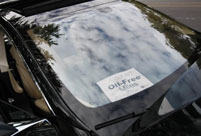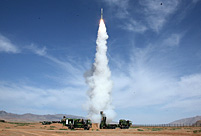Ma Weiwei, a travel agent at a China Comfort Travel outlet in downtown Beijing, was a little upset as he handled a stack of tour contracts for the upcoming seven-day National Day holiday.
"It was twice in thickness last year," he said. "The number of customers has dropped by nearly 60 percent from last year."
The drop in customers is not just a headache for Ma, but for many of China's travel agencies, which heavily rely on package tours to profit.
Tour prices, especially those for Hong Kong, Macao, Thailand and Malaysia, have shot up, in large part because of China's first tourism law, which will come into effect on Oct. 1.
The new law bans the rampant practice of "zero- or negative-fare tours" in the country, which refers to tour services sold by travel agents at or below cost in order to attract travelers, who are later forced to purchase goods or tip agents during their tours.
As a result of adding previously hidden costs to package prices, the price for a seven-day tour to Thailand at Ma's company has shot up to 6,800 yuan (1,106 U.S. dollars) from the previous price of 3,800 yuan.
Many travel agencies have promised that there will be no purchasing, tipping, or paid travel sessions other than those listed in the contracts.
Du Yili, deputy director of the China National Tourism Administration, said that rather than considering the changes to be price hikes, "the current rises signal a return to the normal level."
"It shows that the new law has already had a positive impact," Du said. "The travel agencies have adjusted their business operations according to the rules stipulated in the law."
"If a temporary market downturn were to bring long-term and healthy development of the tourism industry, it would be worthwhile," she said.
Dai Bin, head of the China Tourism Academy, pointed out that the influence of rising prices should not be overestimated, because package tours only accounted for about 3.8 percent of total domestic trips made last year.
The tourism law is designed to address industry woes, protect tourists' interests, and foster the industry's sustainable growth.
Apart from "zero- or negative-fare tours," the new law also outlined measures to address key problems -- unfair competition, wanton price hikes and congestion in scenic spots -- which have plagued the industry and aroused strong public discontent.
 |
 National Plug In Day celebrated in Washington D.C.
National Plug In Day celebrated in Washington D.C. New model of indigenous surface-to-air missiles testfired
New model of indigenous surface-to-air missiles testfired  118.28-carat diamond to be auctioned in HK
118.28-carat diamond to be auctioned in HK Maternal love under streetlight
Maternal love under streetlight Naked foreign student sits in the middle of a road in Haikou
Naked foreign student sits in the middle of a road in Haikou  Colorful Yunnan: Enjoy the natural beauty
Colorful Yunnan: Enjoy the natural beauty Harbin named Chinese city with most beautiful women
Harbin named Chinese city with most beautiful women For last four students, teacher couple sticks to post on island
For last four students, teacher couple sticks to post on island  When big sport stars were kids
When big sport stars were kids PLA's 38th Group Army conduct training
PLA's 38th Group Army conduct training People mourn for victims of mall attack
People mourn for victims of mall attack The last days of Wan Aihua
The last days of Wan Aihua Highlights at 12th National Games of China
Highlights at 12th National Games of China Beijing Film Academy welcomes freshmen
Beijing Film Academy welcomes freshmen Large mahjong party sets new world record
Large mahjong party sets new world recordDay|Week|Month